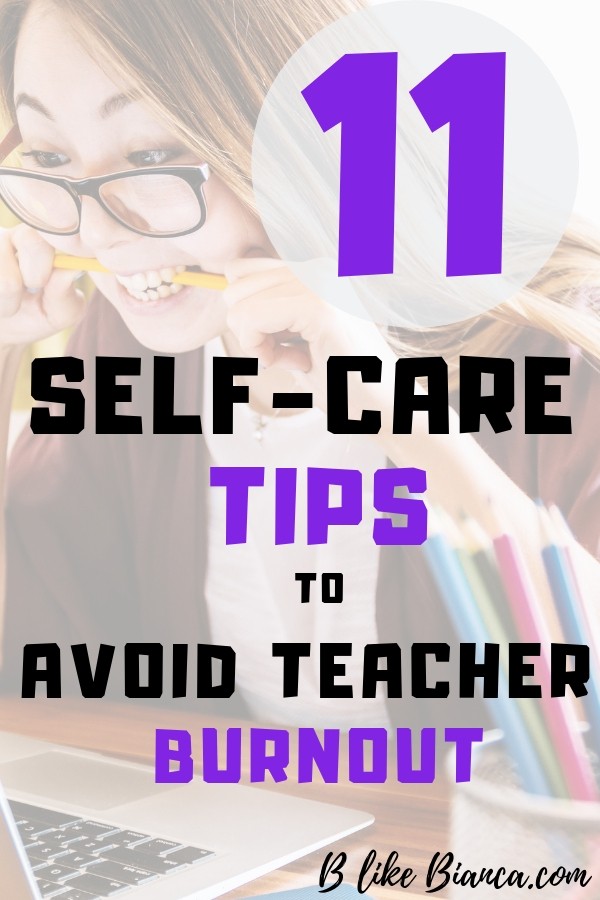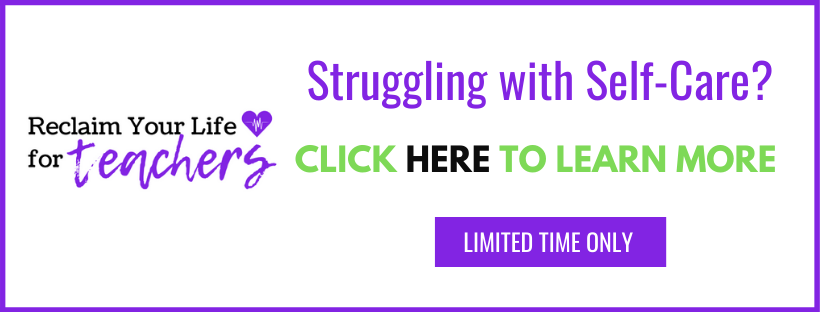Every year, many teachers are leaving the profession at alarming rates. Over half a million according to NPR Education reports. The cause? Teacher burnout.
Underpaid, overworked, unappreciated, and disrespected. These are just some of the adjectives that have been described by teachers and why the burn out rate is so high. They are drained and don’t have any resources to cope over this feeling
According to a recent article by NEA.org, more than 50 percent of the teachers currently in the classroom will either retire or leave the profession over the next five to seven years. Including 20 percent of new hires to leave the classroom within three years of starting the profession.
I was almost one of them.
My Teacher Burnout Story
I was tired. I would come home eat and sit on the couch. An hour later, I would get up to pick up my laptop, just to do more work, on the couch. I was still answering emails, writing IEP’s, and planning until I went to sleep.
I felt like the difference I supposed to be making in the classroom, wasn’t happening. And although my principal was awesome, the professional developments and meetings seem to make me feel worse. The testing pressure and students meeting their goals were getting to me.
In my mind, I thought in order to be a great teacher, you had to give up a part of your own life. Which I did. I would volunteer, and try to be as present as possible at my school. Soon, I was feeling burned out. And I knew I was neglecting my family and myself. This was all within my first 4 years of teaching.
Life felt awful. I gained weight, and I was getting sick all the time. My alarm would go off and I would rush out of bed no matter how much I slept.
At the time I didn’t know it, but I was depressed.
I almost quit teaching.
As year, after year went on, especially into the 5th year of teaching, I was looking for a way out. I was hating coming to work. I counted down every break and any upcoming day off.
At times, I would feel guilty complaining about teaching to non-teachers. Only I would hear in return, “You only work 180 days, you have summers off, 2-weeks for Christmas, Spring Break, and major holidays. You have excellent benefits, the best out of any profession.”
But when my 5th year of teaching was over, I felt stuck. I started researching what else I can do with my education degrees. I didn’t know what to do, my options felt like I was starting over. I was too drained to do that, so I returned the following school year. But it wasn’t even mid-year before I wondered how I can continue.

I had to do something different.
11 Best Tips to Stop Teacher Burnout
1. Take Time Off
I started to take a Friday or Monday off at least once a month, starting after Winter Break. This was just to recharge and rewind. Most teachers start feeling the burnout after Winter Break so this is a good time to utilize some sick leave or Employee Discretionary leave if you have it.
2. Don’t Grade Everything
When I first started teaching, I corrected everything I received back from my students. On top of that, I personally answered all notebook journal entries. I was a crazy person!
One day, my mentor teacher saw my grade book and told me to stop the madness. She told me I didn’t have to grade or assess everything the students do. Some can be done at the moment which doesn’t require anything to be turned in. It helped me start using this chart and having less paperwork piled on my desk.
3. Yoga
I’m not much of a working out person, but I started doing this after my 5th year teaching. I felt like I was getting so much stress from teaching that it was giving me problems with my back. This helped me to relax my muscles and was a lot cheaper than going to a chiropractor.
4. Dim Classroom Lights
I brought in a lamp into my class and turned off one of the classroom lights. This dimming effect not only helped calmed me down on his stressful days but even my students were calmer.
5. Talk to Someone
Sometimes talking to a non-teacher is difficult. They don’t understand how overworked you are as a teacher, they just see the perks. I get it, but when I talked to teachers I worked with sometimes they made me feel worse. The best people you can find are retired teachers, they see the big picture and can give you great ideas.
6. Don’t say Yes to Everything
I’m guilty of this. Especially when you are a new teacher or in a new school. You want to say yes to integrate yourself into the norms, get to know the students and just be present and willing. No wonder teacher burnout rate is so high for new teachers.
In the beginning, I volunteered to chaperone at dances, work the clock at games, and sit on new committees (PBIS, Check-n-Connect, etc.) time and time again. I didn’t know how to say no. But it had to stop.
I eased my way off of each thing I had volunteered for, one by one. All until my time was free. I came to work when I was supposed and left when I was supposed to…or close to leaving time, but now with no obligations. I even stopped coaching after school.
7. Eat Lunch-Alone
It might sound counter productive. But make sure you eat lunch, alone in your classroom. I use to never eat lunch. I would drink tea and would often work through my half-hour of “lunch”.
On rare occasions, if I did make time to eat lunch, I would head to the teacher’s lounge as usual. But often, the teacher’s lounge is too much handle.
I would hear a lot of negativity. Sometimes about students or other staff, but in general it felt toxic. It didn’t make me feel good about being a teacher and that is the environment I wanted to be around.
For an entire year, I ate lunch in my classroom. Once in a while, I would have a couple of students come in. They would read quietly, finish work, or play games on their laptop. I was fine with that.
But most days, I was by myself. I could listen to music or just reflect and journal. When I was a student teacher and needed some quiet time, I use to go sit in my car and relax. Those small moments throughout the day made all the difference.
8. Write/Reflection/Journal
This was a game changer in all areas of my life. My highest times of frustration from teacher burnout felt like I should yell. But when I started journaling it was like a form of recovery.
I wrote and reflected on my wants vs. needs. I found that I was more satisfied with my career choice than I thought, I just had to make some adjustments.
9. Sleep Can’t Wait
As a teacher, is it bad to say I”m not a morning person? Well, I’m not. Never have been, I never will be. At least 7 hours
10. Run/Walk outside
Remember, I’m not big on exercising. I feel like I get enough of that walking around my classroom all day. But during the most heighten time of my teacher burn out period, never moved. I would just set and feel frumpy.
I started walking just 15 minutes around the school or if the weather was nice, I would go to the track or watch P.E. classes. Sometimes I would join in on their games. Just getting outside with give you a new lease on your teaching.
11. Change Schools
I made the decision to switch to a new school. It was the best decision I could have ever made. Sometimes you just need a change. Something new to learn and process. All without the mindset of a new teacher.
Final Thoughts
The teacher burnout rate is at least 4% higher than any other profession. We are exhausted from going above and beyond. I love teaching and being burned out means you gave it everything you had plus some. I understand. But self-care is most important for long-term teaching careers.
Follow some of the steps I took to overcome teacher burnout and if you have a tip or story to share, please in the comments below.
Get a FREE Self-Care Kit Here!
If you need to take your teacher self-care further, check out Reclaim Your Life for Teachers where you can learn the strategies, tools and methods to get your life back on track. Click below for more info.


Hello- I can’t seem to get the link to the chart you mentioned about not grading so much work! I’d love a copy or to see it (: thank you in advance
Hi Dalila,
Thank you for your question. The link goes to a blog post that has a picture of the chart in it and explains how to use it. It’s designed as a formative assessment so you won’t have to take more independent worksheets home to grade. Let me know if that makes sense.
Thank you so much for stopping by.